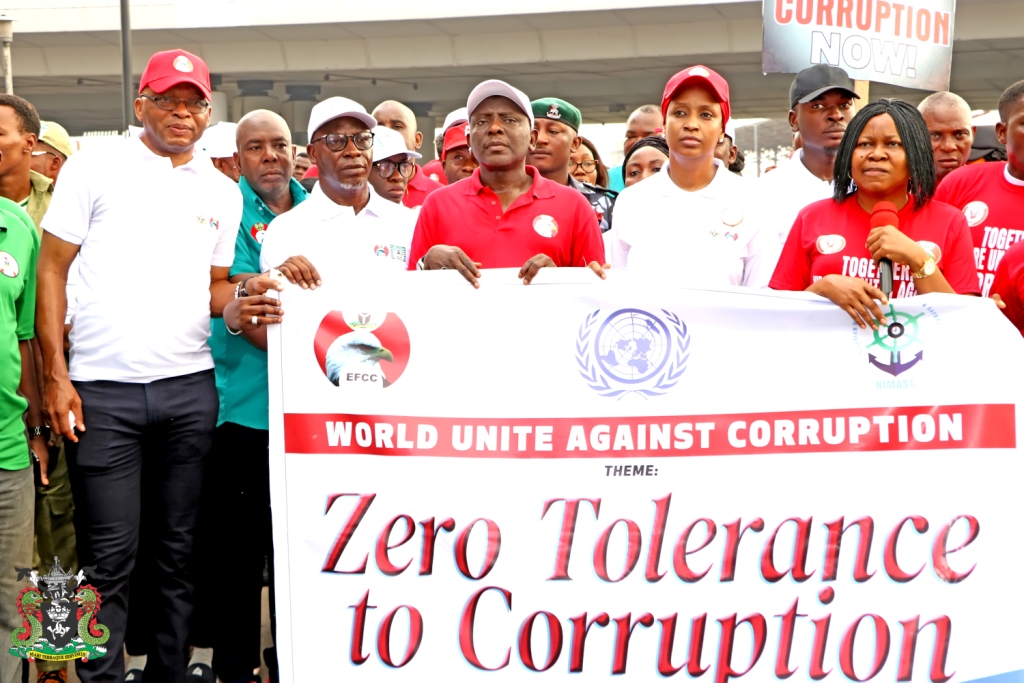The CEO of Global Media Foundation (GLOMeF), an anti-corruption, human rights and media advocacy non-governmental organization, Mr Raphael Godlove Ahenu, has revealed that “In developing countries, fund lost to corruption are estimated 10 times the amount of official development assistance.”
Besides, corruption menace is costing the global economy $3.6 billion dollars – a sum equivalent to more than five per cent of the global Gross Domestic product (GDP).
Speaking at an anti-corruption sensitisation forum held for the Kings Assembly of the Church of Pentecost at Abesim, near Sunyani in Ghana, Mr Ahenu who is the Secretary to the Sunyani Local Accountability Network, (LANeT) said corruption remained the bane of Ghana’s development.
Recall that whereas in 2017, a report disclosed that corruption costs Nigeria well over N400bn, a new report released by the UNDP said corruption costs Ghana economy $2.34b USD annually, saying “This is because the menace affected the entire society as a result of inefficient allocation of resources.”
On average, almost one bribe is paid by every adult Nigerian per year and by combining the total number of people who paid a bribe to a public official with the frequency of those payments, it is estimated that a total of roughly 82.3 million bribes were paid in Nigeria in the 12 months prior to the survey. This results in an average of 0.93 bribes paid per adult, or almost one bribe paid by every adult Nigerian per year.
While noting that roughly 400 billion Nigerian Naira is spent on bribes each year, the 2017 report on bribery in Nigeria averred that “Taking into account the fact that nine out of every ten bribes paid to public officials in Nigeria are paid in cash and the size of the payments made, it is estimated that the total amount of bribes paid to public officials in Nigeria in the 12 months prior to the survey was around 400 billion Nigerian Naira (NGN), the equivalent of $4.6 billion in purchasing power parity (PPP). This sum is equivalent to 39 per cent of the combined federal and state education budgets in 2016.”
In his report on corruption in Nigeria recently, Matthew Page, a nonresident scholar at the Carnegie Endowment for International Peace, said “Corruption is the single greatest obstacle preventing Nigeria from achieving its enormous potential. It drains billions of dollars a year from the country’s economy, stymies development, and weakens the social contract between the government and its people.
“Nigerians view their country as one of the world’s most corrupt and struggle daily to cope with the effects. Yet few analytical tools exist for examining the full range and complexity of corruption in Africa’s largest economy and most populous country. This paper proposes a new, context-specific framework for understanding a problem that will remain a focus of international and domestic Nigerian policy discussions for decades to come.
Continuing, he argued that “The scope and complexity of corruption in Nigeria is immense. This taxonomy details twenty overarching contexts (sectors) that are especially vulnerable to corruption. It also identifies twenty-eight corruption tactics in eight behavioral categories that cut across each of these sectors. These categories apply not only to national-level dynamics but also to corruption at the state and local levels.
Some types of corruption (for example, extortion or contract fraud) are more prevalent in some sectors than in others. Likewise, some are more or less damaging—either directly or via negative multiplier effects—depending on where they occur. This taxonomy acknowledges that corruption in Nigeria is not always clear-cut or limited in focus, but rather it is interconnected, involving a range of behaviors that cleave across sectors.
In Nigeria’s political and institutional sectors, electoral corruption and kleptocratic capture of political party structures unlock corruption opportunities across a range of other sectors. Brown envelope journalism and other types of media corruption are commonly practiced and undermine democratic norms. Meanwhile, the symbiotic relationship between legislative and bureaucratic corruption, embodied by white elephants like Nigeria’s three space agencies, influences a disproportionate share of government expenditures.
Corruption is rife across the country’s economic sectors: petroleum, trade, industrial, agricultural, infrastructure, power sector, banking, and environmental. Together, these forms of corruption erase billions of dollars from Nigeria’s bottom line and prevent it from realizing its great human and economic potential.
Business Hilights Ghana Bureau chief reports that LANeT, a local umbrella of Ghana Anti-Corruption Coalition (GACC) organised the forum to commemorate this year’s UN International Anti-Corruption Day.
The UN International Anti-Corruption Day observed annually, on December 9, following the passage of the UN Convention against Corruption on October 31, 2003 by the UN General Assembly to raise public awareness to fighting corruption around the globe.
Ahenu also identified lack of political will as the major factor hindering the fight against corruption in the country, and called for concerted efforts among the populace to help stem corruption and facilitate accelerated national development.
He regretted that over the years successive governments had failed the nation in the fight against corruption, saying civil society actors and the media must sit up to expose corrupt officials.
He agreed that corruption was acknowledged as a major contributory factor to under-development, saying despite several legislative and institutional reforms, Ghana continued to perform poorly on the Corruption Perception Index (CPI).
While observing that corruption remained the root cause of poor public service delivery and poverty, undermines democracy, subverts the rule of law and exacerbates poverty, LANeT boss said “It is therefore imperative to galvanise efforts in combating corruption in Ghana.”
According to him, “Corruption as the biggest obstacles to achieving the Sustainable Development Goals (SDGs) across the globe, especially in Africa, saying corruption made societies worse off and lowered the living standards of the population.”









